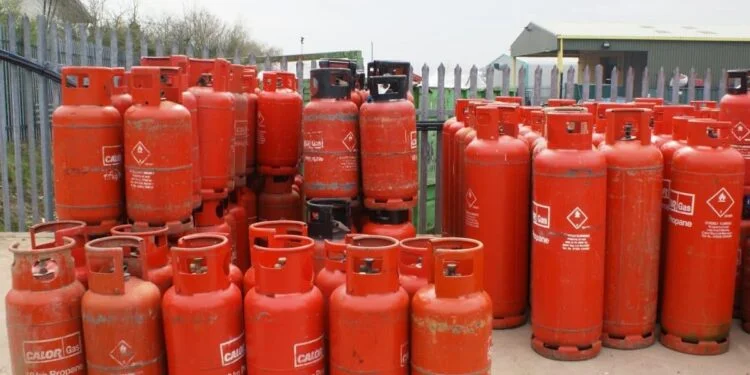Nigerians may be heading for another wave of cooking gas shortages. Retailers across the country are issuing warnings that supplies of Liquefied Petroleum Gas (LPG) are rapidly decreasing. This alarm sounds barely weeks after consumers began recovering from the last round of severe shortages that sent prices soaring.
Retailers suggest a critical issue has emerged: The Dangote Petroleum Refinery has effectively become the only major supplier of LPG to the domestic market. This situation raises serious concerns that any operational disruption at the facility could instantly trigger another severe, nationwide shortage.
Supply Cannot Meet National Demand
The uncertainty over gas availability is already being felt. In Abeokuta, Ogun State, a retailer identified only as Adesola expressed anxiety, stating,
“There is no major improvement in LPG supplies. We don’t know what will happen in the next few days or weeks.”
The current price of cooking gas across the country now fluctuates between N1,200 and N1,500 per kilogram. This marks a steep increase from the approximately N900/{kg}price point before the recent industrial dispute involving the refinery disrupted supply.
Ayobami Olarinoye, National Chairman of the LPG Retailers branch of the Nigeria Union of Petroleum and Natural Gas Workers, confirmed the precarious position.
“As we speak, only the Dangote Refinery is selling the product. While we acknowledge that Dangote is pushing gas into the market, the current production level cannot satisfy local demand,” Olarinoye stated.
He explained that stocks have been depleted at most depots nationwide. This has created a growing supply gap.
Price Disparity Blocks Imports
The supply imbalance has discouraged other key players from importing gas. This is due to a significant price disparity between the refinery’s output and the rates charged by intermediaries.
“Most depot owners do not have gas in stock to complement Dangote’s supply,” Olarinoye added. He stressed the need for government intervention: “There is a need to address the price gap that’s preventing other players from bringing products into the local market for normalcy to return.”
LPG prices dropped slightly in October following the resolution of the industrial dispute, falling from a peak of N2,000\{kg} to around N1,400\{kg}. However, prices have refused to return to the pre-crisis levels of below N1,000}/{kg}. Olarinoye warned that prices could spike again if the refinery temporarily halts production for maintenance.
Refinery Defends Pricing Amid Marketer Markups
Officials at the Dangote Refinery have publicly denied allegations of overpricing their product. They insist that control over retail prices lies outside the company’s jurisdiction.
An official at the refinery stated that marketers acquire LPG from the facility at N715,000 per metric tonne (which is N715}/kg}. “We don’t control retail prices,” the official confirmed. He noted that if retailers sell at N2,000\kg after purchasing at N715}/kg the company cannot intervene.
Previous reports indicated the margin enjoyed by intermediaries and retailers is substantial. Off-takers bought LPG from Dangote at N15.8 million per 20,000 metric tonnes, only to immediately resell the same volume for between N18.4 million and N18.5 million.
Government Intervention and Market Risks
Minister of State for Petroleum Resources (Gas), Ekperikpe Ekpo, recently intervened in the ongoing supply crisis. He vowed to clamp down on marketers who are hoarding gas or exploiting consumers through excessive markups. This intervention followed weeks of public frustration after prices doubled nationwide.
Industry analysts warn that the country’s dependence on a single domestic supplier presents a critical risk to national energy stability. They caution that without adequate diversification and policy support to attract more players into the LPG market, Nigeria will likely face periodic shortages. This instability will continue to place a severe financial burden on households and small businesses.
For now, consumers are bracing for uncertainty and possibly another round of sharp price increases as supply remains tight. The entire market is anxiously watching the next operational move of the Dangote Refinery.






